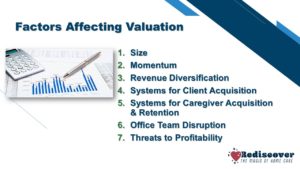By Stephen Tweed
As we end 2020 and stagger into 2021, there are a number of interesting trends in the home care industry that will affect the future of your business. With the impact of Covid-19, the caregiver recruiting and retention crisis, racial protests, and political division in our country, home care companies are all over the board this past year. We’ve had in-depth discussions in our Home Care CEO Mastermind Groups about the impact of these issues. Some of our members companies have grown their businesses 20% in this turbulent year. Others have seen more moderate increases in the mid-single digits. And we’ve seen many smaller companies take a nose dive in revenues, sometimes as much as 40%.
One of the more interesting trends in 2020 has been the number of home care company owners who have sold their businesses, or who have received offers to buy their businesses but so far have decided not to sell. Three of the 42 companies in our Home Care CEO Forum have closed on the sale of their companies. 
Back in October, I was asked by the conference committee of the Home Care Association of America to do a presentation for their annual conference on Mergers and Acquisitions in home care. I did a deep dive into the opportunities and threats presented when a home care owner wants to sell or buy a home care company.
The Beginning of Consolidation in Home Care
For about decade, I’ve been watching for the beginning of consolidation of the home care industry. As you know, this is a highly fragmented industry with 26,000 small companies with a median annual revenue of $1.8 million. While many other industry sectors have gone through major consolidation, home care has remained highly fragmented. However, that is beginning to change as private equity firms have discovered our industry and have made significant investments in technology companies, franchise organizations, and large independent home care companies.
Franchises are Consolidating
My research shows that eight of the ten largest franchisors in homecare have been purchased by private equity firms, or have taken investments. One of the very interesting parts of that pattern is that a number of those PE owned franchise companies are now purchasing independently owned home care agencies, bringing them into the franchise organization, and operating them as company owned offices. Three of the top 10 who are moving forward with this strategy are Comfort Keepers, Home Care Assistance, and Senior Helpers.
We have had several of our mastermind member companies acquired by Home Care Assistance.
Large Independents are Consolidating
We are also seeing a number of very large independent companies taking advantage of the availability of investment money to buy smaller companies and roll them up into a larger home care business. Some of the large independent home care companies that are actively seeking acquisitions include:
- 24Hour Home Care
- Arosa+livHome
- Briggs Corporation
- CareFinders
- Caring People
- Family Resource Home Care
- HouseWorks
- Nova Leap
In the past few years, we have had mastermind members and strategic business coaching clients who were acquired by Arosa+LivHome, CareFinders, Family Resource Home Care, HouseWorks, and Nova Leap.
We have also seen a number of our smaller mastermind members and other independent companies grow to new market territories by making local acquisitions, or doing “tuck in” acquisitions in their own local marketplace.
Seven Factors that Add Value to Your Business 
In preparation for my presentation to the Home Care Association of America, I interviewed a number of home care agency owners who are buyers of other companies, those who have sold an agency, and M&A advisors who are brokers of business acquisitions. From those interviews, I put together seven specific factors that affect the selling price of your business.
- Size – Strategic Buyers and Equity Buyers are looking for larger companies. Some private equity groups that have approached me are looking for companies with at least a million dollars of adjusted EBITDA.
- Momentum – Buyers are looking for businesses that are growing, and have momentum in their growth. This desired growth is both in top line revenue, and in bottom line net income from operations. If you company has been flat for a few years, or is declining in revenue or profitability it will take away from the valuation.
- Revenue Diversification – Buyers are looking for home care companies that have multiple streams of revenue or at least multiple payer sources.
- Systems for Client Acquisition – The leaders of top tier home care companies are systems thinkers. They are looking to buy companies that have systems in place for sales and marketing to bring in new clients. If your business is heavily dependent on you as the owner and seller for your relationships with referral sources, then those relationship go away when you exit the business.
- Systems for Caregiver Recruiting and Retention – As you know. the biggest barrier to growing your home care business is caregiver recruiting and retention. If you can get the caregivers you can get the clients. Putting in place systems for recruiting, selection, on-boarding, and retention of caregivers will bring value to your company. (See the following articles on our Caregiver Quality Assurance program to put these systems in place.)
- Office Team Disruption – Do you have a solid office team in place that will continue to operate the business after you, as the owner, exit the business. The more stable and experienced your team, the more value you company has to a potential buyer.
- Threats to Profitability. While this may be a more subjective factor, buyers are often looking for elements of your business that offer potential threats to profitability. For example, some buyers don’t like to see too much live-in care because the death of a few 24/7 clients causes a huge drop in revenue. Some buyers prefer companies with higher percentages of revenue from third party payers such as Medicaid or VA because they are fearful of the potential volatility of the private pay sector. Some buyers are concerned about geographic location because of the amount of taxes and regulation imposed by state or local government. As part of our Caregiver Quality Assurance program, we have identified a number of states that are “high regulation states” where employment laws, minimum wages, and regulation make the business environment less desirable.
Mastermind Membership Increases the Value of Your Company
Several of our mastermind member companies that have been acquired in the past few years have told me personally how being a member of a Home Care CEO Mastermind Group has helped them increase the value of their businesses. Some of the lessons learned from the mastermind group have helped them with the seven factors that add value. These lessons include …
- Have a Huge Vision – see yourself running a bigger company
- Be a Systems Thinker – many of the conversations in our mastermind meetings revolve around putting systems in place to grow the business.
- Increasing Financial Performance – our groups share data and do their own benchmarking, so members exchange ideas about how to improve financial performance
- Hire Ahead of the Curve – Growing a bigger profitable company means having the right team of people in place. Mastermind members encourage each other in hiring, firing, and developing their teams.
- Craft y0ur Company Culture – Many of our mastermind discussion are focused on the values, behaviors, and expectations that make up your company culture. A strong culture leads to a strong team leads to strong performance.
There are A Few Spaces Available in our Home Care CEO Mastermind Groups.
If you are the owner of an independent home care company that provides more than 3,000 hours per week of services, and if you would like to meet on a regular basis with other owners of similar sized companies to share ideas, solve problems, and support one another, then you want to consider joining a Home Care CEO Mastermind Group. Since no one in any group can compete with any other members of that same group, membership opportunities are limited. To explore whether you qualify for membership, visit https://ceoforum.leadinghomecare.com/mastermind-groups/ and fill out the web form at the bottom of the page. Or call us today at 502-339-0653





